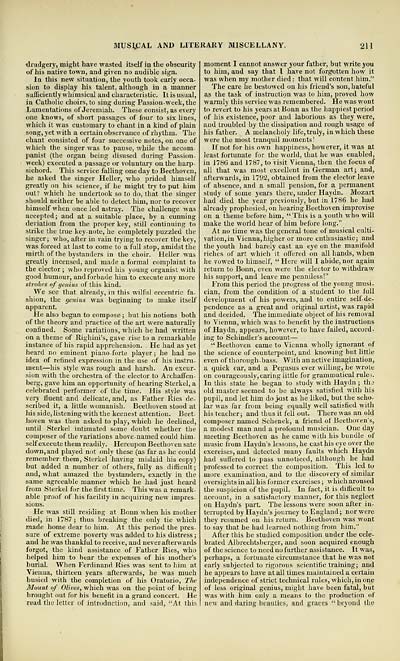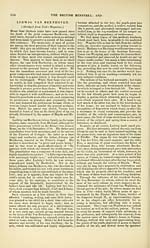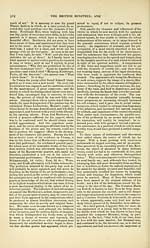Glen Collection of printed music > Printed music > British minstrel, and musical and literary miscellany
(219) Page 211
Download files
Complete book:
Individual page:
Thumbnail gallery: Grid view | List view

MUS^'AL AND LITERARY MISCELLAMY.
211
drudgery, might have wasted itself in the obscurity
of his native town, and given no audible sign.
In this new situation, the youth took early occa-
sion to display his talent, although in a manner
sufficiently whimsical and characteristic. It is usual,
in Catholic choirs, to sing during Passion-week, the
Lamentations of Jeremiah. These consist, as every
one knows, of short passages of four to six lines,
which it was customary to chant in a kind of plain
song, yet with a certain observance of rhythm. The
chant consisted of four successive notes, on one of
which the singer was to pause, while the accom-
panist (the organ being disused during Passion-
week) executed a passage or voluntary on the harp-
sichord. This service falling one day to Beethoven,
he asked the singer Heller, who prided himself
greatly on his science, if he might try to put liim
out? which he undertook so to do, that the singer
should neither be able to detect him, nor to recover
himself when once led astray. The challenge was
accepted; and at a suitable place, by a cunning
deviation from the proper key, still continuing to
strike the true key-note, he completely puzzled the
singer; who, after in vain trying to recover the key,
was forced at last to come to a full stop, amidst the
mirth of the bystanders in the choir. Heller was
greatly incensed, and made a formal complaint to
the elector ; who reproved his young organist with
good humour, and forbade him to execute any more
stroikcs of tjeniiis of this kind.
We see that already, in this wilful eccentric fa-
shion, the genius was beginning to make itself
apparent.
He also began to compose ; but his notions both
of the theory and practice of the art were naturally
confined. Some variations, which he had written
on a theme of Righini's, gave rise to a remarkable
instance of his rapid apprehension. He had as yet
heard no eminent piano-forte player ; he had no
idea of refined expression in the use of his instru-
ment — his style was rough and harsh. An excur-
sion with the orchestra of the elector to Archafl'en-
berg, gave him an opportunity of hearing Sterkel, a
celebrated performer of the time. His style was
very fluent and delicate, and, as Father Ries de-
scribed it, a little womanish. Beethoven stood at
his side, listening with the keenest attention. Beet-
hoven was then asked to play, which he declined,
until Sterkel intimated some doubt whether the
composer of the variations above-named could him-
self execute them readily. Hereupon Beethoven sate
down, and played not only these (as far as he could
remember them, Sterkel having mislaid his copy)
but added a number of others, fully as difficult;
and, what amazed the bystanders, exactly in the
same agreeable manner which he had just heard
from Sterkel for the first time. This was a remark-
able proof of his facility in acquiring new impres-
sions.
He was still residing at Bonn when his mother
died, in 1T87; thus breaking the only tie which
made home dear to him. At this period the pres-
sure of extreme poverty was added to his distress ;
and he was thankful to receive, and never afterwards
forgot, the kind assistance of Father Ries, who
helped him to hear the expenses of his mother's
burial. When Ferdinand Ries was sent to him at
Vienna, thirteen years afterwards, he was much
busied with the completion of his Oratorio, The
Mount of Olives, which was on the point of being
brought out for his benefit in a grand concert. He
read the letter of introduction, and said, "At this
moment I cannot answer your father, but write you
to him, and say that I have not forgotten how it
was when my mother died : that will content him."
The care he bestowed on his friend's son, hateful
as the task of instruction was to him, proved how
warmly this service was remembered. He was wont
to revert to his years at Bonn as the happiest period
of his existence, poor and laborious as they were,
and troubled by the dissipation and rough usage of
his father. A melancholy life, truly, in which these
were the most tranquil moments !
If not for his own happiness, however, it was at
least fortunate for the world, that he was enabled,
in 1786 and 1787, to visit Vienna, then the focus of
all that was most excellent in German art; and,
afterwards, in 1792, obtained from the elector leave
of absence, and a small pension, for a permanent
study of some years there, under Haydn. Mozart
had died the year previously, but in 1786 he had
already prophesied, on hearing Beethoven improvise
on a theme before him, " This is a youth who will
make the world hear of him before long."
At no time was the general tone of musical culti-
vation, in Vienna, higher or more enthusiastic; and
the youth had barely cast an eye on the manifold
riches of art which it oB'ered on all hands, when
he vowed to himself, " Here will I abide, nor again
return to Bonn, even were the elector to withdraw
his support, and leave me penniless!"
From this period the progress of the young musi-
cian, from the condition of a student to the lull
development of his powers, and to entire self-de-
pendence as a great and original artist, was rapid
and decided. The immediate object of his removal
to Vienna, which was to benefit by the instructions
of Haydn, appears, however, to have failed, accord-
ing to Scbindler's account — •
" Beethoven came to Vienna wholly ignorant of
the science of counterpoint, and knowing but little
even of thorough-bass. With an active imagination,
a quick ear, and a Pegasus ever willing, he wrote
on courageously, caring little for grammatical rules.
In this state he began to study with Haydn ; thj
old master seemed to be always satisfied with his
pupil, and let him do just as he liked, but the scho-
lar was far from being equally well satisfied with
his teacher; and thus it fell out. There was an old
composer named Schenck, a friend of Beethoven's,
a modest man and a profound musician. One day
meeting Beethoven as he came with his bundle of
music irom Haydn's lessons, he cast his eye over the
exercises, and detected many faults which Haydn
had sufl'ered to pass unnoticed, although he had
professed to correct the composition. This led to
more examination, and to the discovery of similar
oversights in all his former exercises ; which aroused
the suspicion of the pupil. In fact, it is difficult to
account, in a satisfactory manner, for this neglect
on Haydn's part. The lessons were soon after in-
terrupted by Haydn's journey to England ; nor were
they resumed on his return. Beethoven was wont
to say that he had learned nothing from him."
After this he studied composition under the cele-
brated Albrechtsberger, and soon acquired enough
of the science to need no further assistance. It was,
perhaps, a fortunate circumstance that he was not
early subjected to rigorous scientific training; and
he appears to have at all times maintained a certain
independence of strict technical rules, which, in one
of less original genius, might have lieen fatal, but
was with him only a means to the production of
new and daring beauties, and grates " beyond the
211
drudgery, might have wasted itself in the obscurity
of his native town, and given no audible sign.
In this new situation, the youth took early occa-
sion to display his talent, although in a manner
sufficiently whimsical and characteristic. It is usual,
in Catholic choirs, to sing during Passion-week, the
Lamentations of Jeremiah. These consist, as every
one knows, of short passages of four to six lines,
which it was customary to chant in a kind of plain
song, yet with a certain observance of rhythm. The
chant consisted of four successive notes, on one of
which the singer was to pause, while the accom-
panist (the organ being disused during Passion-
week) executed a passage or voluntary on the harp-
sichord. This service falling one day to Beethoven,
he asked the singer Heller, who prided himself
greatly on his science, if he might try to put liim
out? which he undertook so to do, that the singer
should neither be able to detect him, nor to recover
himself when once led astray. The challenge was
accepted; and at a suitable place, by a cunning
deviation from the proper key, still continuing to
strike the true key-note, he completely puzzled the
singer; who, after in vain trying to recover the key,
was forced at last to come to a full stop, amidst the
mirth of the bystanders in the choir. Heller was
greatly incensed, and made a formal complaint to
the elector ; who reproved his young organist with
good humour, and forbade him to execute any more
stroikcs of tjeniiis of this kind.
We see that already, in this wilful eccentric fa-
shion, the genius was beginning to make itself
apparent.
He also began to compose ; but his notions both
of the theory and practice of the art were naturally
confined. Some variations, which he had written
on a theme of Righini's, gave rise to a remarkable
instance of his rapid apprehension. He had as yet
heard no eminent piano-forte player ; he had no
idea of refined expression in the use of his instru-
ment — his style was rough and harsh. An excur-
sion with the orchestra of the elector to Archafl'en-
berg, gave him an opportunity of hearing Sterkel, a
celebrated performer of the time. His style was
very fluent and delicate, and, as Father Ries de-
scribed it, a little womanish. Beethoven stood at
his side, listening with the keenest attention. Beet-
hoven was then asked to play, which he declined,
until Sterkel intimated some doubt whether the
composer of the variations above-named could him-
self execute them readily. Hereupon Beethoven sate
down, and played not only these (as far as he could
remember them, Sterkel having mislaid his copy)
but added a number of others, fully as difficult;
and, what amazed the bystanders, exactly in the
same agreeable manner which he had just heard
from Sterkel for the first time. This was a remark-
able proof of his facility in acquiring new impres-
sions.
He was still residing at Bonn when his mother
died, in 1T87; thus breaking the only tie which
made home dear to him. At this period the pres-
sure of extreme poverty was added to his distress ;
and he was thankful to receive, and never afterwards
forgot, the kind assistance of Father Ries, who
helped him to hear the expenses of his mother's
burial. When Ferdinand Ries was sent to him at
Vienna, thirteen years afterwards, he was much
busied with the completion of his Oratorio, The
Mount of Olives, which was on the point of being
brought out for his benefit in a grand concert. He
read the letter of introduction, and said, "At this
moment I cannot answer your father, but write you
to him, and say that I have not forgotten how it
was when my mother died : that will content him."
The care he bestowed on his friend's son, hateful
as the task of instruction was to him, proved how
warmly this service was remembered. He was wont
to revert to his years at Bonn as the happiest period
of his existence, poor and laborious as they were,
and troubled by the dissipation and rough usage of
his father. A melancholy life, truly, in which these
were the most tranquil moments !
If not for his own happiness, however, it was at
least fortunate for the world, that he was enabled,
in 1786 and 1787, to visit Vienna, then the focus of
all that was most excellent in German art; and,
afterwards, in 1792, obtained from the elector leave
of absence, and a small pension, for a permanent
study of some years there, under Haydn. Mozart
had died the year previously, but in 1786 he had
already prophesied, on hearing Beethoven improvise
on a theme before him, " This is a youth who will
make the world hear of him before long."
At no time was the general tone of musical culti-
vation, in Vienna, higher or more enthusiastic; and
the youth had barely cast an eye on the manifold
riches of art which it oB'ered on all hands, when
he vowed to himself, " Here will I abide, nor again
return to Bonn, even were the elector to withdraw
his support, and leave me penniless!"
From this period the progress of the young musi-
cian, from the condition of a student to the lull
development of his powers, and to entire self-de-
pendence as a great and original artist, was rapid
and decided. The immediate object of his removal
to Vienna, which was to benefit by the instructions
of Haydn, appears, however, to have failed, accord-
ing to Scbindler's account — •
" Beethoven came to Vienna wholly ignorant of
the science of counterpoint, and knowing but little
even of thorough-bass. With an active imagination,
a quick ear, and a Pegasus ever willing, he wrote
on courageously, caring little for grammatical rules.
In this state he began to study with Haydn ; thj
old master seemed to be always satisfied with his
pupil, and let him do just as he liked, but the scho-
lar was far from being equally well satisfied with
his teacher; and thus it fell out. There was an old
composer named Schenck, a friend of Beethoven's,
a modest man and a profound musician. One day
meeting Beethoven as he came with his bundle of
music irom Haydn's lessons, he cast his eye over the
exercises, and detected many faults which Haydn
had sufl'ered to pass unnoticed, although he had
professed to correct the composition. This led to
more examination, and to the discovery of similar
oversights in all his former exercises ; which aroused
the suspicion of the pupil. In fact, it is difficult to
account, in a satisfactory manner, for this neglect
on Haydn's part. The lessons were soon after in-
terrupted by Haydn's journey to England ; nor were
they resumed on his return. Beethoven was wont
to say that he had learned nothing from him."
After this he studied composition under the cele-
brated Albrechtsberger, and soon acquired enough
of the science to need no further assistance. It was,
perhaps, a fortunate circumstance that he was not
early subjected to rigorous scientific training; and
he appears to have at all times maintained a certain
independence of strict technical rules, which, in one
of less original genius, might have lieen fatal, but
was with him only a means to the production of
new and daring beauties, and grates " beyond the
Set display mode to: Large image | Transcription
Images and transcriptions on this page, including medium image downloads, may be used under the Creative Commons Attribution 4.0 International Licence unless otherwise stated. ![]()
| Special collections of printed music > Glen Collection of printed music > Printed music > British minstrel, and musical and literary miscellany > (219) Page 211 |
|---|
| Permanent URL | https://digital.nls.uk/91437573 |
|---|
| Description | Scottish songs and music of the 18th and early 19th centuries, including music for the Highland bagpipe. These are selected items from the collection of John Glen (1833 to 1904). Also includes a few manuscripts, some treatises, and other books on the subject. |
|---|
| Description | The Glen Collection and the Inglis Collection represent mainly 18th and 19th century Scottish music, including Scottish songs. The collections of Berlioz and Verdi collected by bibliographer Cecil Hopkinson contain contemporary and later editions of the works of the two composers Berlioz and Verdi. |
|---|

